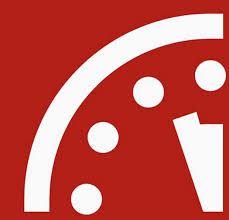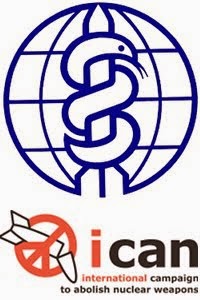It is an appopriate time for a serious reminder that, even with the overarching (yet important) emphasis of many of the nuclear powers on terrorists getting their hands on nuclear weapons or materials, the greatest probability of a disaster related to nuclear weapons is still an exchange of these horrific weapons between the existing nuclear powers.
The following article published today at CNN provides that reminder in clear terms. Working to abolish the Trident weapons system (and all nuclear weapons for that matter) this quote from the article hits home:
Each U.S. Trident submarine can destroy 100 cities and produce the global famine described in the study.And that's just ONE submarine. Here at the Bangor Trident submarine base we have 8 of the 14 ballistic missile submarines mentioned in the article. Overkill by many orders of magnitude!!!
******************
A nuclear clash could starve the world - CNN.com
By Jayantha Dhanapala and Ira Helfand, Special to CNN, Fri May 11,2012
Editor's note: Jayantha Dhanapala is a former ambassador to the United States from Sri Lanka, U.N. under-secretary general for disarmament and chairman of the 1995 Non-Proliferation Treaty Review and Extension Conference. Ira Helfand is the past president of Physicians for Social Responsibility and current North American vice president of the International Physicians for the Prevention of Nuclear War.
(CNN) -- Recent ballistic missile tests by India, Pakistan and North Korea -- which has ominously threatened to "reduce to ashes"the South Korean military "in minutes" -- are once again focusing the world's attention on the dangers of nuclear war.
This concern was dramatically underscored in a new report released at the Nobel Peace Laureates Summit in Chicago. Titled "Nuclear Famine: A Billion People at Risk"
http://www.psr.org/nuclear-weapons/nuclear-famine-report.pdf
The study shows that even a limited nuclear war, involving less than half of 1% of the world's nuclear arsenals, would cause climate disruption that could set off a global famine.
The study, prepared by International Physicians for the Prevention of Nuclear War and its U.S. affiliate, Physicians for Social Responsibility, used a scenario of 100 Hiroshima-sized bombs exploded in a war between India and Pakistan. If there were such a war, the study estimated that 1 billion people, one-sixth of the human race, could starve over the following decade.
Along with recent events, these findings require a fundamental change in our thinking about nuclear weapons.
The study, in positing a war between India and Pakistan, shows the importance of understanding that smaller nuclear powers, not just the United States and Russia, pose a threat to the whole world.
But the greater lesson concerns the forces of the larger nuclear powers. Each U.S. Trident submarine can destroy 100 cities and produce the global famine described in the study. The United States has 14 ofthem, a fleet of land-based nuclear missiles, and an arsenal of nuclear weapons that can be delivered by bombers. The Russians possess the same grotesque overkill capacity.
Even the most ambitious arms reductions under discussion would leavethe United States and Russia with 300 warheads each, most of them 10 to 30 times larger than a Hiroshima sized bomb. This would be a massive arsenal capable of producing the global famine scenario many, many times over.
These arsenals are an archaic, but lethal, holdover from the Cold War. Their continued existence poses an ongoing threat to allhumanity.
Steps can and should be taken immediately to lessen this danger. Substantial numbers of these weapons remain on what The New York Timeshas described as "hair-trigger alert." They can be fired in 15 minutes or less and destroy cities a continent away 30 minutes later. This alert posture creates the needless danger of an accidental or unintended launch, and the United States and Russia have had many close calls, preparing to launch a nuclear strike at the other under the mistaken belief they were under attack.
The most recent of these near-misses that we know about took place in January 1995, well after the end of the Cold War. The United States and Russia should stand down their nuclear arsenals so that it takes longer to launch their missiles, lessening the danger of an accidental war. U.S. President Barack Obama and Russian President Vladamir Putin can take this step on their own without negotiating a formaltreaty.
Beyond this, it is time to begin urgent talks aimed at reducing the U.S. and Russian arsenals as the next essential step toward multilateral negotiations for a Nuclear Weapons Convention, a binding, verifiable, enforceable treaty that eliminates nuclear weapons altogether.
As former Soviet President Mikhail Gorbachev observed on reviewing the new "Nuclear Famine" study: "I am convinced that nuclear weapons must be abolished. Their use in a military conflict is unthinkable; using them to achieve political objectives is immoral.
"Over 25 years ago, President Ronald Reagan and I ended our summit meeting in Geneva with a joint statement that 'Nuclear war cannot be won and must never be fought,' and this new study underscores in stunning and disturbing detail why this is the case."
# # #
(Source URL for this article: http://www.cnn.com/2012/05/11/opinion/dhanapala-helfand-nuclear-famine/index.html)
Blogger's Note: Steven Starr has done tremendous research on nuclear famine. Learn more at http://www.nucleardarkness.org/












No comments:
Post a Comment